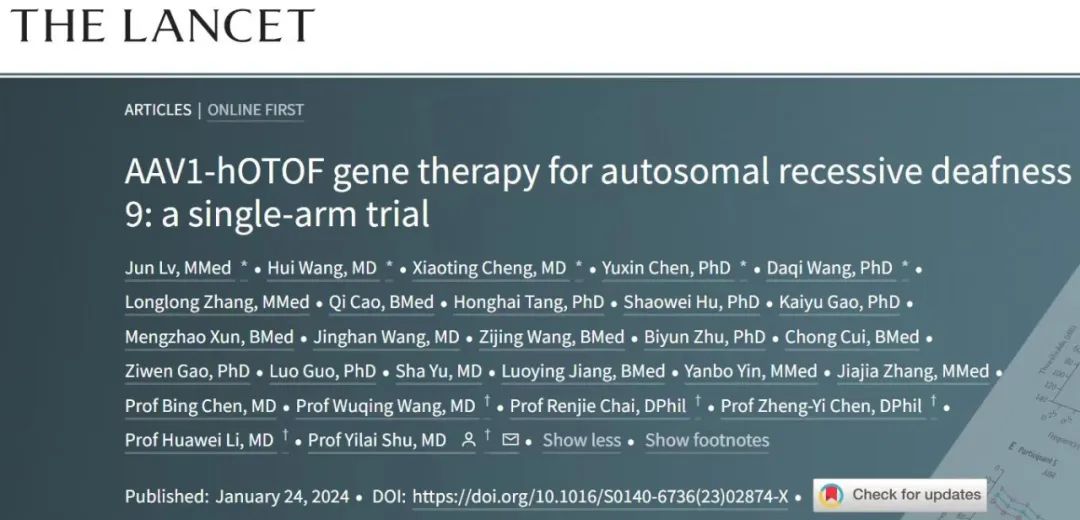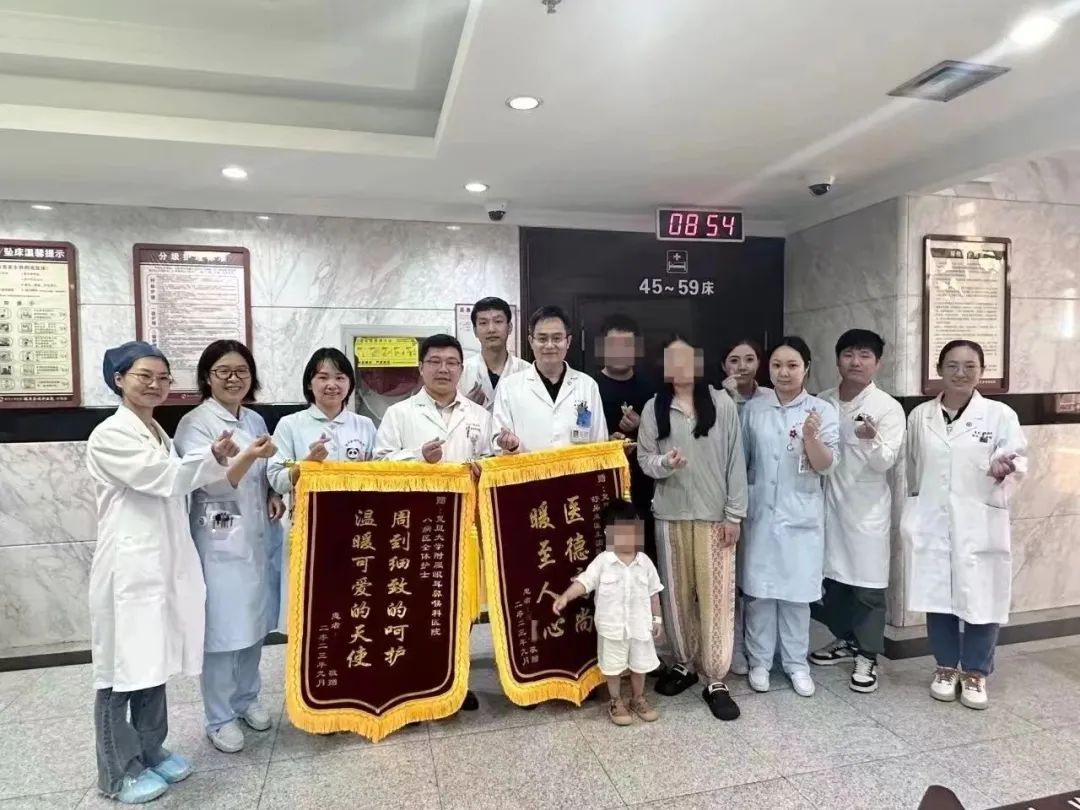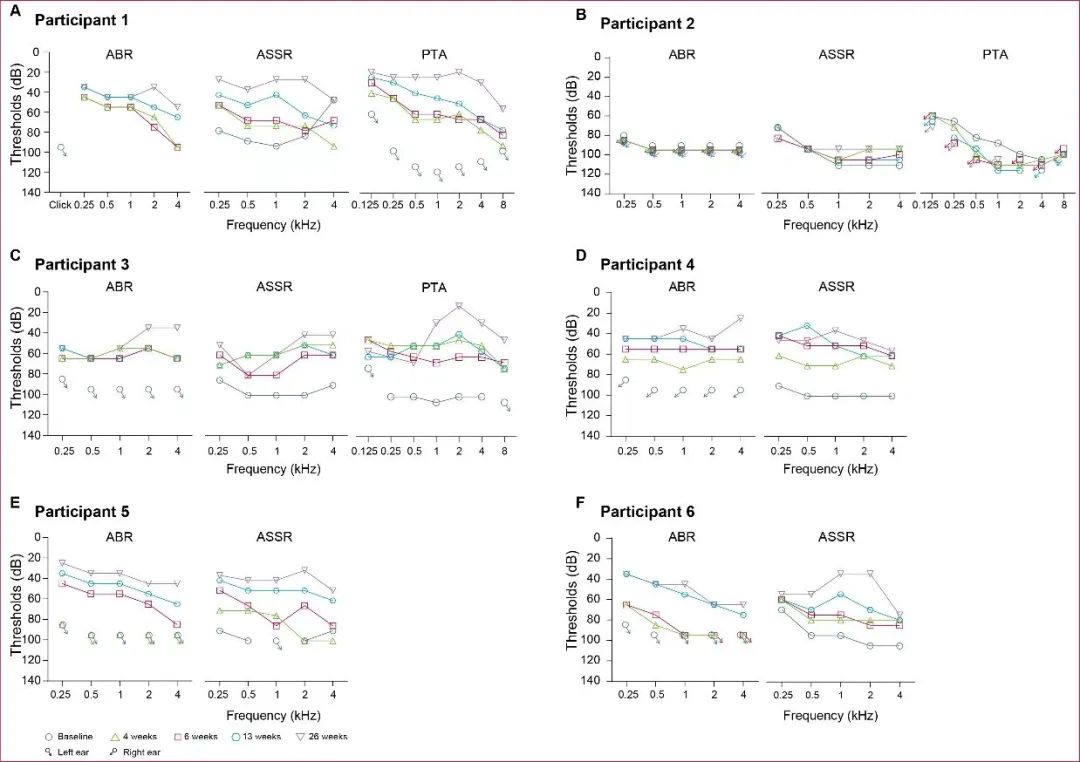
On January 25, the Eye and ENT Hospital of Fudan University, along with collaborators from Harvard Medical School, Southeast University, and Shanghai Dingxin Gene Technology Co., Ltd., published a groundbreaking clinical trial titled “AAV1-hOTOF Gene Therapy for Autosomal Recessive Deafness 9: a single-arm trial” in the esteemed medical journal The Lancet (Impact Factor: 169), marking the world’s first successful clinical trial of gene therapy for congenital hearing loss.
The study demonstrates the safety and effectiveness of gene therapy in treating hereditary hearing loss, offering hope for a potential cure for this genetic condition. This research is anticipated to advance the development and application of gene therapy drugs for hearing loss. The project, under the guidance of Professor Li Huawei, director of ENT Institute and Otorhinolaryngology Department, Eye & ENT Hospital of Fudan University, is led by Professor Shu Yilai from the Eye and ENT Hospital of Fudan University.

The clinical trial targeted the OTOF gene mutation causing congenital hearing loss, a condition affecting 26 million people globally, with 60% of new cases in China each year linked to genetic factors. This condition hampers children’s speech, cognition, and intellectual development. Currently, there is no effective treatment available. Leveraging advancements in biomedicine, gene therapy is considered a promising strategy to address congenital hearing loss. It involves delivering a normal functioning gene directly to the inner ear, expressing a protein that restores normal function and improves or restores the patient’s hearing fundamentally.
Professor Shu Yilai, with over a decade of expertise in genetic treatment for hearing loss, led the team to develop the gene therapy drug RRG-003 for OTOF gene mutations. They also innovatively created a precise and minimally invasive delivery pathway and equipment for the ear. OTOF gene mutations, associated with DFNB9, a type of autosomal recessive congenital hearing loss, result in severe or profound hearing loss and speech disorders. In China, 41% of infants and young children with auditory nerve diseases have deafness due to OTOF gene mutations.
Adeno-Associated Virus (AAV) is a common gene therapy delivery vector. However, the OTOF gene exceeds the loading capacity of a single AAV. To overcome this challenge in inner ear delivery, the research team utilized a dual-vector delivery system, with two AAV vectors carrying the OTOF gene. This restored protein expression in an OTOF-related deafness animal model, significantly improving hearing.
“To put it simply, if one car isn’t powerful enough to move the cargo, we need two cars to move together. Transporting the medication follows the same idea, after the drug is injected into the body, these two cars need to merge to form a complete gene that can take effect,” explained Shu. Their team also conducted safety assessments in mouse and monkey models. Based on this research foundation, the project received ethical approval from the Eye and ENT Hospital of Fudan University in June 2022. In October 2022, the team officially launched clinical trial recruitment, marking the initiation of the world’s first genetic treatment for congenital hearing loss in children. Subsequently, patients of various ages, from older children to toddlers, were gradually enrolled, with the longest follow-up period exceeding one year. Children in the trial are now able to engage in everyday conversations.

This clinical trial included six children with OTOF gene mutations who received gene therapy. Administered through minimally invasive ear injection, the drug showed good safety and tolerability during the follow-up period. Five children experienced significant improvements in hearing and speech function after treatment. This marks the world’s first effective clinical trial of gene therapy for hearing loss, with the largest number of cases and the first human trial using a dual AAV vector.
By capitalizing on the complementary strengths of academia and industry, the project, in collaboration with Shanghai Dingxin Gene Technology Co., Ltd. overcame barriers in gene therapy drug development, industrial design, manufacturing, safety evaluation, and greatly propelled the development of gene therapy for hearing loss, bringing new hope to patients.
Professor Shu Yilai, Professor Li Huawei and Professor Wang Wuqing from the Eye and ENT Hospital of Fudan University, Professor Chen Zhengyi from Harvard Medical School, Professor Chai Renjie from Southeast University share the corresponding authorship. Lv Junbo, Wang Hui, Cheng Xiaoting, Chen Yuxin, and Wang Daqi from the Eye and ENT Hospital of Fudan University are the co-first authors of this article.
“We fully support and actively encourage cutting-edge exploration in science and clinical translational research, strive to overcome challenges, and look forward to more epoch-making breakthroughs to better safeguard public health,” said Zhou Xingtao, director of the Eye and ENT Hospital of Fudan University.
Link🏄🏻:https://www.thelancet.com/journals/lancet/article/PIIS0140-6736(23)02874-X/fulltext
